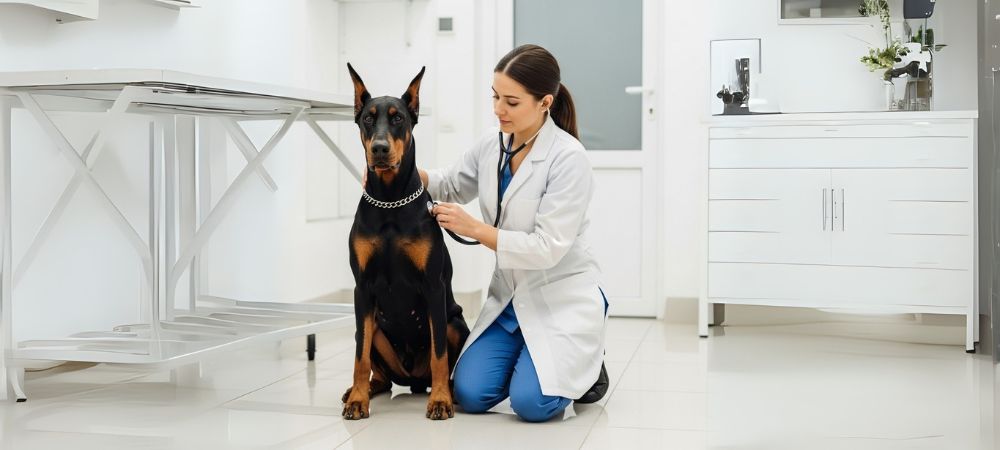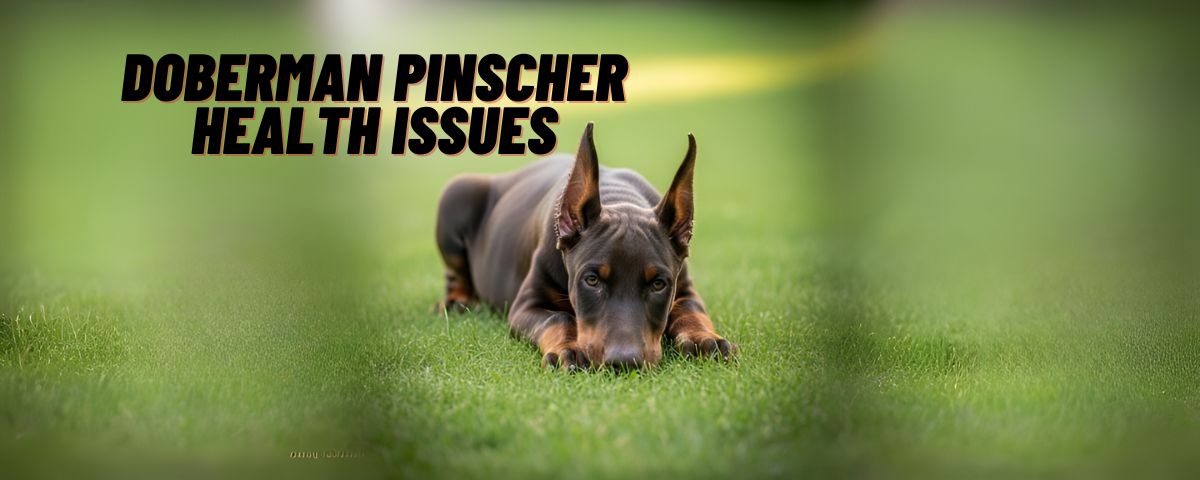
Understanding Thermokinetics of Proteins in Dog Food: Warming, Cooling, and Neutral Proteins
March 10, 2025Dobermans are one of the most iconic and intelligent dog breeds, known for their loyalty, strength, and elegance. However, if you’re a proud Doberman owner or considering becoming one, it’s essential to understand the Doberman Pinscher health concerns that may arise throughout their life. While Dobermans are generally robust and active, they are also predisposed to certain Doberman health issues due to genetics and breed-specific vulnerabilities.
This guide is designed to help you understand common health issues with Doberman Pinschers, recognize warning signs early, and learn how to best care for your Doberman’s long-term health. Whether you’re dealing with a young pup or an older Doberman, being proactive is the key to ensuring a long, happy, and healthy life for your furry companion.
Do Dobermans Have Health Issues?

You might be wondering, do Dobermans have health issues? Like any purebred dog, Dobermans are susceptible to certain genetic and acquired conditions. While many of these can be managed or even prevented with proper care, some Doberman dog health problems are serious and life-threatening.
Understanding Doberman Pinscher health issues begins with recognizing that they are not isolated incidents; they’re often the result of genetic predisposition, environmental triggers, or improper care. Educating yourself on these potential Doberman health problems is the first step in becoming a responsible and informed pet parent.
1. Dilated Cardiomyopathy (DCM)
One of the most serious Doberman diseases, DCM is a heart condition where the heart becomes enlarged and cannot pump blood efficiently. Unfortunately, Dobermans have one of the highest incidences of DCM among all dog breeds.
Symptoms of DCM:
- Fatigue and weakness
- Difficulty breathing
- Fainting or collapse
- Sudden death (in severe cases)
Regular cardiac check-ups, including echocardiograms and Holter monitoring, are essential, especially if you have a middle-aged or older Doberman.
2. Von Willebrand’s Disease
This is a genetic bleeding disorder where the blood doesn’t clot properly. It is one of the lesser-known but critical Doberman illnesses to be aware of.
Signs include:
- Excessive bleeding from minor cuts
- Nosebleeds
- Bleeding gums
- Prolonged bleeding after surgery
While there’s no cure, it can be managed with careful monitoring and avoiding surgeries or medications that exacerbate bleeding.
3. Hip Dysplasia
Hip dysplasia is a structural abnormality where the hip joint doesn’t fit correctly, leading to pain and arthritis. It’s among the more common health problems with Dobermans, especially as they age.
Symptoms:
- Limping or stiffness
- Difficulty standing or climbing stairs
- Reluctance to exercise
Good breeding practices, proper nutrition, and weight control are essential to minimizing the risk of this painful condition.
4. Hypothyroidism
Hypothyroidism is a hormonal imbalance caused by insufficient production of thyroid hormone. It’s one of the more manageable Doberman common health issues, but it requires lifelong treatment.
Signs include:
- Lethargy and fatigue
- Weight gain
- Skin problems
- Hair thinning or hair loss
Your vet can diagnose this with a simple blood test and usually manage it with daily hormone replacement therapy.
5. Wobbler Syndrome (Cervical Vertebral Instability)
This is a neurological disease that affects the spine in the neck region, leading to unsteady walking and weakness. It’s one of the more severe Doberman Pinscher health concerns and can lead to paralysis if untreated.
Symptoms:
- Wobbly gait, especially in rear legs
- Neck pain
- Weakness
- Muscle atrophy
Treatment can involve physical therapy, medications, or surgery, depending on severity.
6. Bloat (Gastric Dilatation-Volvulus)
Bloat is a sudden, life-threatening condition where the stomach twists and fills with gas. Though not exclusive to Dobermans, it’s a significant Doberman health problem due to their deep chest structure.
Signs of bloat:
- Distended abdomen
- Unsuccessful attempts to vomit
- Restlessness
- Rapid breathing
Bloat requires emergency surgery. Preventative measures include feeding smaller, frequent meals and avoiding vigorous exercise after eating.
7. Liver and Kidney Disease
These are more commonly found in older Doberman health issues, though they can occur at any age. Poor diet, genetics, or prolonged use of medications can contribute.
Symptoms:
- Increased thirst and urination
- Vomiting
- Loss of appetite
- Yellowing of eyes or gums (in liver disease)
Routine blood work can help detect these conditions early.
8. Skin Conditions and Allergies

Skin problems are common Doberman Pinscher health issues, often due to allergies, autoimmune conditions, or parasites.
Common signs:
- Itchy, red skin
- Hair loss
- Hot spots or sores
- Dandruff
A high-quality Doberman diet rich in omega fatty acids and essential nutrients can help maintain skin health and reduce allergic reactions.
9. Cancer
Cancer is, unfortunately, a rising concern among Doberman diseases, particularly as dogs age. The most common types seen in Dobermans include osteosarcoma (bone cancer) and hemangiosarcoma (blood vessel cancer).
Symptoms vary, but may include:
- Lumps or swelling
- Sudden weight loss
- Lethargy
- Changes in behavior
Early detection through routine vet exams is your best defense.
10. Eye Disorders
Dobermans can also be prone to eye issues such as progressive retinal atrophy (PRA), cataracts, and cherry eye. While not life-threatening, these conditions can impact your dog’s quality of life.
Signs to watch for:
- Cloudy eyes
- Squinting
- Eye discharge
- Bumping into objects
Regular eye exams can help detect and manage these issues early.
Proactive Management of Doberman Dog Health Problems

Many Doberman Pinscher health concerns can be mitigated or managed with a proactive approach. Here’s what you can do to ensure your Doberman lives a long and healthy life:
1. Routine Veterinary Visits
Annual check-ups—or twice a year for senior dogs—are vital. Early detection is key to treating most Doberman illnesses.
2. High-Quality Nutrition
A well-balanced Doberman diet tailored to your dog’s age, activity level, and health needs can help prevent several common conditions like obesity, skin problems, and joint issues.
3. Genetic Testing and Responsible Breeding
If you’re purchasing from a breeder, ask for genetic testing and health clearances. Many Doberman health problems are inherited, so buying from a responsible breeder can significantly reduce risk.
4. Exercise and Mental Stimulation
Regular physical activity not only keeps your Doberman fit but also mentally stimulated. This helps with emotional well-being and prevents destructive behavior linked to stress or boredom.
Pet Insurance for Dobermans
Given the number of Doberman Pinscher health issues, investing in pet insurance for Dobermans is a wise decision. Emergency surgeries for conditions like bloat or long-term treatments for DCM can be extremely costly.
Pet insurance helps manage these expenses, giving you peace of mind and ensuring your Doberman gets the best possible care when it matters most.
Health Considerations for Older Dobermans
As your dog ages, older Doberman health issues begin to surface more frequently. Senior Dobermans are more prone to:
- Arthritis and joint pain
- Cognitive dysfunction (dog dementia)
- Organ failure (especially kidneys and liver)
- Vision and hearing loss
Regular senior wellness exams, a joint-supportive Doberman diet, and possibly physical therapy can make these years comfortable and fulfilling.
Conlusion
To sum it up, Doberman Pinscher health concerns are real, but with the right approach, many can be prevented or managed. By staying informed, investing in regular veterinary care, providing a proper Doberman diet, and considering pet insurance for Dobermans, you’ll give your loyal companion the best chance at a long, healthy, and happy life.
Whether you’re dealing with Doberman dog health problems in a puppy or trying to navigate older Doberman health issues, knowledge is your greatest ally. Always consult with Executive Order Doberman Kennel and stay ahead of potential Doberman illnesses through prevention and early intervention.
FAQs
Q: What are the most common Doberman Pinscher health issues?
A: DCM, hip dysplasia, hypothyroidism, bloat, and skin allergies are among the most common.
Q: Can Doberman health problems be prevented?
A: While not all are preventable, early detection, proper care, and responsible breeding can reduce risks significantly.
Q: Are diseases in Dobermans genetic?
A: Many Doberman diseases, like DCM and Von Willebrand’s Disease, are inherited. Choosing a reputable breeder is crucial.
Q: How can I tell if my Doberman is sick?
A: Lethargy, appetite changes, weight loss, coughing, and behavior shifts are signsthat something may be wrong.
Q: Should I get pet insurance for my Doberman?
A: Yes. It helps manage the cost of treating serious Doberman illnesses like bloat, cancer, and heart disease.




